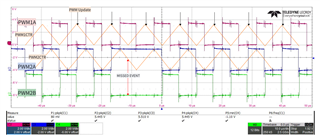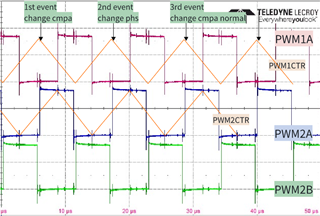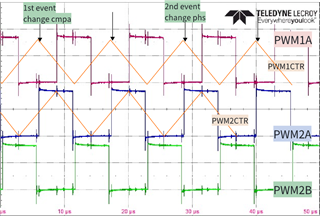Hi Champ,
I would like to seek your advice regarding an issue I am currently facing. My application utilizes two PWM modules, PWM1 and PWM2. Phase is enabled on PWM2, with PWM1 as SYNCIN (master).
The problem arises when the phase is slowly descending near the CMPA value. I have observed that PWM2 skips for one cycle. Based on some posts I found here, the suggested solution is to handle the phase update by changing the CMPA value to be less than TBPHS in one cycle and then changing back the CMPA to the normal value in the next cycle.
However, this method(*) does not resolve the issue in my case. Are there any specific settings or handlers that I need to add?
I have attached my code here for your reference.
void PWM_init(void){
EPwm1Regs.TBPRD = pwm_prd;
EPwm1Regs.TBPHS.bit.TBPHS = 0; // PWM-1 serves as reference
EPwm1Regs.CMPA.bit.CMPA = pwm_cmpa;
EPwm1Regs.CMPB.bit.CMPB = 0;
EPwm1Regs.TBCTL.bit.CLKDIV = TB_DIV1;
EPwm1Regs.TBCTL.bit.HSPCLKDIV = TB_DIV1; //change to sysclk
EPwm1Regs.TBCTL.bit.CTRMODE = TB_COUNT_UPDOWN; // Symmetrical mode
EPwm1Regs.TBCTL.bit.PRDLD = TB_SHADOW;
EPwm1Regs.EPWMSYNCOUTEN.bit.ZEROEN = 1;
EPwm1Regs.EPWMSYNCINSEL.bit.SEL = SYNC_IN_SRC_DISABLE_ALL;
EPwm1Regs.CMPCTL.bit.SHDWAMODE = CC_SHADOW;
EPwm1Regs.CMPCTL.bit.SHDWBMODE = CC_SHADOW;
EPwm1Regs.CMPCTL.bit.LOADAMODE = CC_CTR_ZERO;
EPwm1Regs.CMPCTL.bit.LOADBMODE = CC_CTR_ZERO;
EPwm1Regs.AQCTLA.bit.CAD = AQ_SET; // Active high
EPwm1Regs.AQCTLA.bit.CAU = AQ_CLEAR;
EPwm1Regs.AQCTLB.bit.CAD = AQ_CLEAR; // Active LOW
EPwm1Regs.AQCTLB.bit.CAU = AQ_SET;
EPwm1Regs.DBCTL.bit.OUT_MODE = DB_FULL_ENABLE; // Enable Dead-band module
EPwm1Regs.DBCTL.bit.POLSEL = DB_ACTV_HIC; // Active Hi complementary
EPwm1Regs.DBFED.bit.DBFED = Deadtime;
EPwm1Regs.DBRED.bit.DBRED = Deadtime;
EPwm2Regs.TBPRD = pwm_prd;
EPwm2Regs.TBPHS.bit.TBPHS = pwm_phs;
EPwm2Regs.CMPA.bit.CMPA = pwm_cmpa;
EPwm2Regs.CMPB.bit.CMPB = 0;
EPwm2Regs.TBCTL.bit.CLKDIV = TB_DIV1;
EPwm2Regs.TBCTL.bit.HSPCLKDIV = TB_DIV1;
EPwm2Regs.TBCTL.bit.CTRMODE = TB_COUNT_UPDOWN;
EPwm2Regs.TBCTL.bit.PHSEN = TB_ENABLE;
EPwm2Regs.TBCTL.bit.PRDLD = TB_SHADOW;
EPwm2Regs.EPWMSYNCINSEL.bit.SEL = SYNC_IN_SRC_SYNCOUT_EPWM1;
EPwm2Regs.CMPCTL.bit.SHDWAMODE = CC_IMMEDIATE;
EPwm2Regs.CMPCTL.bit.SHDWBMODE = CC_IMMEDIATE;
// EPwm2Regs.CMPCTL.bit.LOADAMODE = CC_CTR_ZERO_PRD; // load on CTR=Zero
// EPwm2Regs.CMPCTL.bit.LOADBMODE = CC_CTR_ZERO_PRD; // load on CTR=Zero
EPwm2Regs.AQCTLA.bit.CAD = AQ_CLEAR; //Active LOW
EPwm2Regs.AQCTLA.bit.CAU = AQ_SET;
EPwm2Regs.AQCTLB.bit.CAD = AQ_SET; //Active HIGH
EPwm2Regs.AQCTLB.bit.CAU = AQ_CLEAR;
EPwm2Regs.DBCTL.bit.OUT_MODE = DB_FULL_ENABLE; // Enable Dead-band module
EPwm2Regs.DBCTL.bit.POLSEL = DB_ACTV_HIC; // Active Hi complementary
EPwm2Regs.DBFED.bit.DBFED = Deadtime;
EPwm2Regs.DBRED.bit.DBRED = Deadtime;
EPwm2Regs.TBCTL.bit.PHSEN = TB_ENABLE;
}
void phase_update(uint16_t phase)
{
static uint16_t temp;
temp = (uint16_t)(((uint32_t)phase* EPwm1Regs.TBPRD) / 180);
pwm_phs = temp;
update_request = 1;
}
void PWMUpdate(void)
{
if (skip_pwm_flag == 1) {
EPwm2Regs.TBPHS.bit.TBPHS = pwm_phs;
pwm_phs_prev = EPwm2Regs.TBPHS.bit.TBPHS;
skip_pwm_flag++;
} else if (skip_pwm_flag == 2) {
EPwm2Regs.CMPA.bit.CMPA = (EPwm2Regs.TBPRD >> 1);
skip_pwm_flag = 0;
}
if (update_request == 1) {
update_request = 0;
if (pwm_phs_prev > EPwm2Regs.CMPA.bit.CMPA && pwm_phs <= EPwm2Regs.CMPA.bit.CMPA) {
EPwm2Regs.CMPA.bit.CMPA = pwm_phs - 1;
skip_pwm_flag = 1;
} else {
EPwm2Regs.TBPHS.bit.TBPHS = pwm_phs;
pwm_phs_prev = EPwm2Regs.TBPHS.bit.TBPHS;
}
}
}
E2E references(*)
https://e2e.ti.com/support/microcontrollers/c2000-microcontrollers-group/c2000/f/c2000-microcontrollers-forum/1163045/tms320f28069-epwm-miss-cycle-while-tbphs-change?tisearch=e2e-sitesearch&keymatch=tbphs%2525252525252520cmpa%2525252525252520pwm%2525252525252520missed#
https://e2e.ti.com/support/microcontrollers/c2000-microcontrollers-group/c2000/f/c2000-microcontrollers-forum/1161072/tms320f28033-when-tbphs-load-value-is-less-than-cmpa-value-the-below-figure-will-the-aq-action-be-lost





